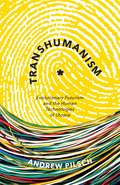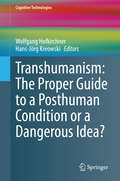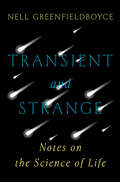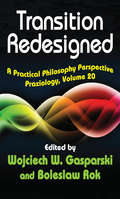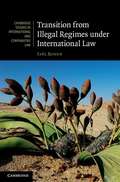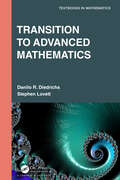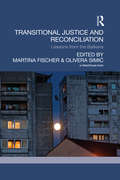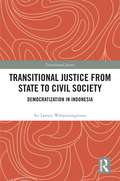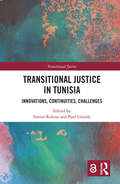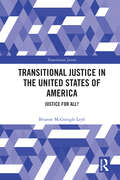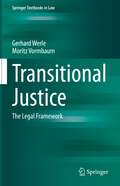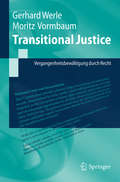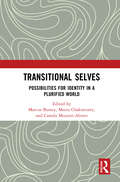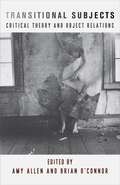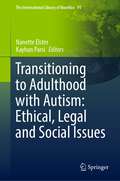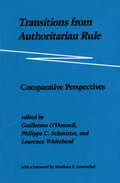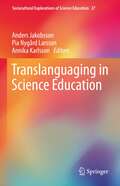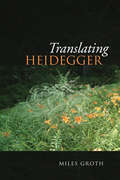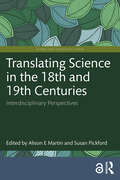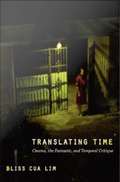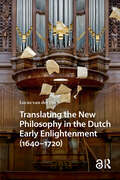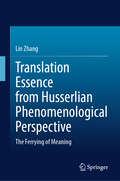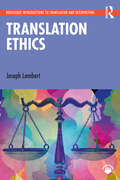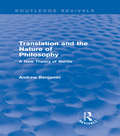- Table View
- List View
Transhumanism: Evolutionary Futurism and the Human Technologies of Utopia
by Andrew PilschTranshumanism posits that humanity is on the verge of rapid evolutionary change as a result of emerging technologies and increased global consciousness. However, this insight is dismissed as a naive and controversial reframing of posthumanist thought, having also been vilified as &“the most dangerous idea in the world&” by Francis Fukuyama. In this book, Andrew Pilsch counters these critiques, arguing instead that transhumanism&’s utopian rhetoric actively imagines radical new futures for the species and its habitat.Pilsch situates contemporary transhumanism within the longer history of a rhetorical mode he calls &“evolutionary futurism&” that unifies diverse texts, philosophies, and theories of science and technology that anticipate a radical explosion in humanity&’s cognitive, physical, and cultural potentialities. By conceptualizing transhumanism as a rhetoric, as opposed to an obscure group of fringe figures, he explores the intersection of three major paradigms shaping contemporary Western intellectual life: cybernetics, evolutionary biology, and spiritualism. In analyzing this collision, his work traces the belief in a digital, evolutionary, and collective future through a broad range of texts written by theologians and mystics, biologists and computer scientists, political philosophers and economic thinkers, conceptual artists and Golden Age science fiction writers. Unearthing the long history of evolutionary futurism, Pilsch concludes, allows us to more clearly see the novel contributions that transhumanism offers for escaping our current geopolitical bind by inspiring radical utopian thought.
Transhumanism: The Proper Guide to a Posthuman Condition or a Dangerous Idea? (Cognitive Technologies)
by Wolfgang Hofkirchner Hans-Jörg KreowskiThis book examines the contributions of the transhumanism approach to technology, in particular the contributed chapters are wary of the implications of this popular idea.The volume is organized into four parts concerning philosophical, military, technological and sociological aspects of transhumanism, but the reader is free to choose various reading patterns. Topics discussed include gene editing, the singularity, ethical machines, metaphors in AI, mind uploading, and the philosophy of art, and some perspectives taken or discussed examine transhumanism within the context of the philosophy of technology, transhumanism as a derailed anthropology, and critical sociological aspects that consider transhumanism in the context of topical concerns such as whiteness, maleness, and masculinity.The book will be of value to researchers engaged with artificial intelligence, and the ethical, societal, and philosophical impacts of science and technology.
Transient and Strange: Notes on the Science of Life
by Nell GreenfieldboyceAn astonishing debut from the beloved NPR science correspondent: intimate essays about the intersection of science and everyday life. In her career as a science reporter, Nell Greenfieldboyce has reported from inside a space shuttle, the bottom of a coal mine, and the control room of a particle collider; she’s presented news on the color of dinosaur eggs, ice worms that live on mountaintop glaciers, and signs of life on Venus. In this, her debut book, she delivers a wholly original collection of powerful, emotionally raw, and unforgettable personal essays that probe the places where science touches our lives most intimately. Expertly weaving her own experiences of motherhood and marriage with an almost devotional attention to the natural world, Greenfieldboyce grapples with the weighty dualities of life: birth and death, constancy and impermanence, memory and doubt, love and aging. She looks for a connection to the universe by embarking on a search for the otherworldly glint of a micrometeorite in the dust, consults meteorologists and storm chasers on the eerie power of tornadoes to soothe her children’s anxieties, and processes her adolescent oblivion through the startling discovery of black holes. Inspired throughout by Walt Whitman’s invocation to the “transient and strange,” she remains attuned to the wildest workings of our world, reflecting on the incredible leap of the humble flea or the echoing truth of a fetal heartbeat. A beautiful blend of explanatory science, original reporting, and personal experience, Transient and Strange captures the ache of ordinary life, offering resonant insights into both the world around us and the worlds within us.
Transition Redesigned: A Practical Philosophy Perspective (Praxiology Ser.)
by Boleslaw Rok Wojciech W. GasparskiTransition Redesigned deals with the philosophical bases of different types of transition: change in the economy, organizational/institutional change, and change in social and individual relationships. The editors' primary goal is to give further impetus to a much-needed worldwide debate on the issue of transition towards a better future.The volume reviews transitions made in different areas of human activity, assesses their relevancy, and analyzes their contexts. During this century, different organizations and institutions will undergo a level of radical and global change that has rarely been seen. The expected shift must be addressed in terms of a multidimensional transition toward building a sustainable society.Do we have an understanding of transition relevant to the task of meeting at least some of the challenges presented in this volume? Do we need a radical innovation for redesigning the transition that may enforce real social and ethical responsibilities into organizational practice on different levels and bring to life new ideas? Transition Redesigned seeks to answer these questions.
Transition from Illegal Regimes under International Law
by Yaël RonenYaël Ronen analyses the international legal ramifications of illegal territorial regimes, namely the illegal annexation of territory or illegal declarations of independence, by reference to the stage of transition from an illegal territorial regime to a lawful one. Six case studies (Namibia, Zimbabwe, the Baltic States, the South African Bantustans, East Timor and northern Cyprus) are used to explore the tension between the invalidity of the illegal regime's acts and their effectiveness, with respect to the international relations of such territories, their domestic legal systems, the status of settlers and land transfers. Relying heavily on primary and previously unconsidered sources, she focuses on the international legal constraints on the post-transition regime's policy, particularly in the context of international human rights law.
Transition to Advanced Mathematics (Textbooks in Mathematics)
by Stephen Lovett Danilo R. DiedrichsThis unique and contemporary text not only offers an introduction to proofs with a view towards algebra and analysis, a standard fare for a transition course, but also presents practical skills for upper-level mathematics coursework and exposes undergraduate students to the context and culture of contemporary mathematics. The authors implement the practice recommended by the Committee on the Undergraduate Program in Mathematics (CUPM) curriculum guide, that a modern mathematics program should include cognitive goals and offer a broad perspective of the discipline. Part I offers: An introduction to logic and set theory. Proof methods as a vehicle leading to topics useful for analysis, topology, algebra, and probability. Many illustrated examples, often drawing on what students already know, that minimize conversation about "doing proofs." An appendix that provides an annotated rubric with feedback codes for assessing proof writing. Part II presents the context and culture aspects of the transition experience, including: 21st century mathematics, including the current mathematical culture, vocations, and careers. History and philosophical issues in mathematics. Approaching, reading, and learning from journal articles and other primary sources. Mathematical writing and typesetting in LaTeX. Together, these Parts provide a complete introduction to modern mathematics, both in content and practice. Table of Contents Part I - Introduction to Proofs Logic and Sets Arguments and Proofs Functions Properties of the Integers Counting and Combinatorial Arguments RelationsPart II - Culture, History, Reading, and Writing Mathematical Culture, Vocation, and Careers History and Philosophy of Mathematics Reading and Researching Mathematics Writing and Presenting Mathematics Appendix A. Rubric for Assessing Proofs Appendix B. Index of Theorems and Definitions from Calculus and Linear Algebra Bibliography Index Biographies Danilo R. Diedrichs is an Associate Professor of Mathematics at Wheaton College in Illinois. Raised and educated in Switzerland, he holds a PhD in applied mathematical and computational sciences from the University of Iowa, as well as a master’s degree in civil engineering from the Ecole Polytechnique Fédérale in Lausanne, Switzerland. His research interests are in dynamical systems modeling applied to biology, ecology, and epidemiology. Stephen Lovett is a Professor of Mathematics at Wheaton College in Illinois. He holds a PhD in representation theory from Northeastern University. His other books include Abstract Algebra: Structures and Applications (2015), Differential Geometry of Curves and Surfaces, with Tom Banchoff (2016), and Differential Geometry of Manifolds (2019).
Transitional Justice and Reconciliation: Lessons from the Balkans
by Olivera Simic Martina FischerScholars and practitioners alike agree that somehow the past needs to be addressed in order to enable individuals and collectives to rebuild trust and relationships. However, they also continue to struggle with critical questions. When is the right moment to address the legacies of the past after violent conflict? How can societies address the past without deepening the pain that arises from memories related to the violence and crimes committed in war? How can cultures of remembrance be established that would include and acknowledges the victims of all sides involved in violent conflict? How can various actors deal constructively with different interpretations of facts and history? Two decades after the wars, societies in Bosnia, Serbia and Croatia – albeit to different degrees – are still facing the legacies of the wars of the 1990s on a daily basis. Reconciliation between and within these societies remains a formidable challenge, given that all three countries are still facing unresolved disputes either at a cross-border level or amongst parallel societies that persist at a local community level. This book engages scholars and practitioners from the regions of former Yugoslavia, as well as international experts, to reflect on the achievements and obstacles that characterise efforts to deal with the past. Drawing variously on empirical studies, theoretical discussions, and practical experience, their contributions offer invaluable insights into the complex relationship between transitional justice and conflict transformation.
Transitional Justice from State to Civil Society: Democratization in Indonesia
by Sri Lestari WahyuningroemThis book is the first to offer an in-depth analysis of transitional justice as an unfinished agenda in Indonesia’s democracy. Examining the implementation of transitional justice measures in post-authoritarian Indonesia, this book analyses the factors within the democratic transition that either facilitated or hindered the adoption and implementation of transitional justice measures. Furthermore, it contributes key insights from an extensive examination of ‘bottom-up’ approaches to transitional justice in Indonesia: through a range of case studies, civil society-led initiatives to truth-seeking and local reconciliation efforts. Based on extensive archival, legal and media research, as well as interviews with key actors in Indonesia’s democracy and human rights’ institutions, the book provides a significant contribution to current understandings of Indonesia’s democracy. Its analysis of the failure of state-centred transitional justice measures, and the role of civil society, also makes an important addition to comparative transitional justice studies. It will be of considerable interest to scholars and activists in the fields of Transitional Justice and Politics, as well as in Asian Studies.
Transitional Justice in Tunisia: Innovations, Continuities, Challenges
by Paul Gready Simon RobinsThis book engages comprehensively with the dynamics of the transitional justice process in Tunisia and its mechanisms, elaborating lessons for transitional justice practice globally. Grounded in new empirical material as well as a broader awareness of transitional justice, this book provides a thorough assessment of transitional justice in Tunisia. Beyond an overview of the process, it critically engages with key questions such as the extent to which the process articulated global contemporary practice, such as liberal state-building and narrow conceptions of justice as civil-political rights, and to which it generated novel approaches at odds with the mainstream that can inform global practice. The book examines how the transitional justice process in Tunisia has been contextualised and made relevant to the nation’s circumstances and needs. It looks at innovation at the level of formal mechanisms and at the dynamics of mobilisation and contestation surrounding transitional justice both from civil society organisations and victims’ groups. Bringing together analysis from legal scholars, social scientists as well as activists and practitioners, the book challenges the legalism of transitional justice discourse globally, engendering a dialogue between these legal and judicial approaches on the one hand and alternative, more diverse and radical approaches to justice on the other, in order to both deal with the past and to address ongoing injustice. This first book in English to address the dynamics and mechanisms of the transitional justice process in Tunisia will appeal to students and scholars of transitional justice, human rights, peacebuilding, conflict and peace studies, development, and security studies, as well as policymakers and practitioners in these fields, and others with interests in Middle Eastern studies.
Transitional Justice in the United States of America: Justice for All? (Transitional Justice)
by Brianne McGonigle LeyhThis book employs a transitional justice lens in order to explore justice initiatives in the United States of America.Transitional justice developed out of societal demands to better address serious abuse, injustice, and atrocities – initially in South American post-authoritarian contexts transitioning to democratic states and later elsewhere, but especially within post-conflict contexts. The lens of transitional justice has only rarely been extended to the United States and never in a comprehensive way. This book aims to provide a contemporary and critical analysis of relevant developments and debates within the United States related to transitional justice. Using the framework of the five main ‘pillars’ of transitional justice – truth, reparation, accountability, guarantee of non-repetition, and memory – the book identifies and explores relevant justice initiatives, both historical and contemporary, across federal, state, and local levels in the United States. The empirical examples taken up show how a broad array of civil society actors are driving transitional justice processes across the country. By recognizing both extraordinary and ordinary justice processes as transitional justice, the book offers a broader understanding of how groups navigate transitions to more democratic, peaceful, and socially just societies. The examples further shed light on the expansion of the field to nontraditional contexts, the relationship between global norms and local practices, and the role of law and political compromise. The book concludes by emphasizing the value and power of the plurality of initiatives taking shape across the United States but calls for a more coherent transitional justice policy at the national level.This book is relevant for scholars and students with interests in transitional justice, conflict resolution, human rights, Indigenous studies, culture, and race.
Transitional Justice: The Legal Framework (Springer Textbooks in Law)
by Gerhard Werle Moritz VormbaumThe expression “transitional justice” emerged at the end of the Cold War, during the transition from dictatorships to democracies, and serves as a central concept in dealing with systemic injustice. This textbook examines the basic principles of transitional justice and explores its core mechanisms, including prosecutions, amnesties, truth commissions, reparations, and vetting the public service. It elaborates the substance and legal framework of these mechanisms and discusses current challenges.The book provides extensive material illustrating a wide variety of transitional justice situations. “This book summarizes the subjects of transitional justice and Vergangenheitsbewältigung systematically and clearly” (Joachim Gauck, German Federal President, 2012-2017).
Transitional Justice: Vergangenheitsbewältigung durch Recht (Springer-Lehrbuch)
by Gerhard Werle Moritz VormbaumDieses Buch bietet die erste systematische Gesamtdarstellung zum Thema Transitional Justice in deutscher Sprache. Der Ausdruck „Transitional Justice“ hat sich zum Ende des Kalten Krieges beim Übergang von Diktaturen zur Demokratie etabliert und dient als Leitbegriff zur Aufarbeitung von Systemunrecht. Das vorliegende Werk entwickelt die Grundprinzipien von Transitional Justice und behandelt die fünf wesentlichen Aufarbeitungsoptionen – Strafverfolgung, Amnestien, Wahrheitskommissionen, Wiedergutmachung sowie die Überprüfung des öffentlichen Dienstes. Aktuelle Herausforderungen werden diskutiert. Reichhaltiges Anschauungsmaterial beleuchtet über 50 Aufarbeitungssituationen. Das Buch verfolgt einen doppelten Zweck: Es soll zum einen Rechtswissenschaftlerinnen und Rechtswissenschaftlern sowie praktisch tätigen Juristinnen und Juristen den Zugang zur Materie erleichtern. Zum anderen soll es benachbarten Disziplinen einen konzentrierten Einblick in die rechtlichen Leitprinzipien von Transitional Justice ermöglichen.
Transitional Selves: Possibilities for Identity in a Plurified World
by Marcus Bussey, Meera Chakravorty, and Camila Mozzini-AlisterThis book engages with the ethics and practices of identity formation in a world experiencing identity stress. It engages with crucial questions such as: What models are shaping our view of ourselves and the society in which we live? What images ground our perception of what is true and real? How have the images been historically produced? What are the effects of such models on definitions of self? Should we break free from these images if we get to know what they are? Is it possible to change our models in order to create freer identities? Through a range of distinctive lenses, the essays in the volume deals with the ideas of the ‘liminal self’, the ‘digital self’, ‘identities in flux’, and offers up ‘anthropologies of self/selves’ that situates current identity processes within their cultures and explores strategies and dilemmas from this perspective. This key volume will be of interest to scholars and researchers of literary stories, critical theory, social theory, social anthropology, philosophy, and political philosophy.
Transitional Subjects: Critical Theory and Object Relations (New Directions in Critical Theory #67)
by Amy Allen Axel Honneth C. Fred Alford James Martel Owen Hulatt Joel Whitebook Johanna Meehan Noëlle McAfee Alessandro Ferrera Sara BeardsworthCritical social theory has long been marked by a deep, creative, and productive relationship with psychoanalysis. Whereas Freud and Fromm were important cornerstones for the early Frankfurt School, recent thinkers have drawn on the object-relations school of psychoanalysis. Transitional Subjects is the first book-length collection devoted to the engagement of critical theory with the work of Melanie Klein, Donald Winnicott, and other members of this school. Featuring contributions from some of the leading figures working in both of these fields, including Axel Honneth, Joel Whitebook, Noëlle McAfee, Sara Beardsworth, and C. Fred Alford, it provides a synoptic overview of current research at the intersection of these two theoretical traditions while also opening up space for further innovations.Transitional Subjects offers a range of perspectives on the critical potential of object-relations psychoanalysis, including feminist and Marxist views, to offer valuable insight into such fraught social issues as aggression, narcissism, “progress,” and torture. The productive dialogue that emerges augments our understanding of the self as intersubjectively and socially constituted and of contemporary “social pathologies.” Transitional Subjects shows how critical theory and object-relations psychoanalysis, considered together, have not only enriched critical theory but also invigorated psychoanalysis.
Transitioning to Adulthood with Autism: Ethical, Legal and Social Issues (The International Library of Bioethics #91)
by Nanette Elster Kayhan ParsiThis book offers the first ever book-length treatment of the topic of transitioning from adolescence to adulthood with autism and the attendant ethical, legal and social issues for the individual as well as caregivers and professionals. It features experts in a variety of areas (law, bioethics, philosophy, pediatrics, neurology, medicine, psychology, special education, social work, employment, civic participation, social media) who provide commentary on these areas and the relevant ethical/legal/social challenges young autistic adults face in these different areas. This is an indispensable read for educators, therapists, and other professionals who work in transition with young autistic adults.
Transitions from Authoritarian Rule: Comparative Perspectives
by Laurence Whitehead Guillermo O’Donnell Philippe C. SchmitterAn array of internationally noted scholars examines the process of democratization in Southern Europe and Latin America. The authors provide new interpretations of both current and historical efforts of nations to end periods of authoritarian rule and to initiate transition to democracy, efforts that have met with widely varying degrees of success and failure. Extensive case studies of individual countries, a comparative overview, and a synthesis conclusions offer important insights for political scientists, students, and all concerned with the prospects for democracy. In Volume 3, despite the unique contexts of transitions in individual countries, significant points of comparison emerge — such as the influence of foreign nations and the role of agents outside the government. These analyses explore both intra- and interregional similarities and differences.
Translanguaging in Science Education (Sociocultural Explorations of Science Education #27)
by Anders Jakobsson Pia Nygård Larsson Annika KarlssonThis edited volume explores diverse translanguaging practices in multilingual science classrooms in Hong Kong, Lebanon, Luxembourg, South Africa, Sweden and the United States. It presents novel opportunities for using students’ home, first or minority languages as meaning-making tools in science education. It also invites to explore the use of language resources and other multimodal resources, such as gestures and body language. In addition, it discusses and problematizes contingent hindrances and obstacles that may arise from these practices within various contexts around the world. This includes reviewing different theoretical starting points that may be challenged by such an approach. These issues are explored from different perspectives and methodological focus, as well as in several educational contexts, including primary, middle, secondary levels, higher education, as well as in after-school programs for refugee teenagers. Within these contexts, the book highlights and shares a range of educational tools and activities in science education, such as teacher-led classroom-talk, language-focused teaching, teachers’ use of meta-language, teachers’ scaffolding strategies, small-group interactions, and computer-supported collaborative learning.
Translating Feminism: Interdisciplinary Approaches to Text, Place and Agency (Palgrave Studies in Language, Gender and Sexuality)
by Kristina Schulz Penelope Morris Maud Anne Bracke Julia C. BullockThis edited book addresses the diversity across time and space of the sites, actors and practices of feminist translation from 1945-2000. The contributors examine what happens when a politically motivated text is translated linguistically and culturally, the translators and their aims, and the strategies employed when adapting texts to locally resonating discourses. The collection aims to answer these questions through case studies and a conceptual rethinking of the process of politically engaged translation, considering not only trained translators and publishers, but also feminist activists and groups, NGOs and writers. The book will be of interest to students and researchers in the fields of translation studies, gender/women's studies, literature and feminist history.
Translating Heidegger
by Miles GrothDespite Martin Heidegger’s influence on twentieth-century philosophy, understanding his way of thinking is difficult if one relies solely on the English translations of his work. Since Gilbert Ryle misjudged his work in a 1929 review of Sein und Zeit, Heidegger’s philosophy has remained an enigma to many scholars who cannot read the original German texts. In Translating Heidegger, Groth points to mistranslations as the root cause of misunderstanding Heidegger. Translators have not achieved clarity regarding Heidegger’s fundamental words, an understanding of which is crucial to gaining access to his thought. Having been mistranslated from the ancient Greek into Latin and then into modern European languages, Heidegger’s philosophies have largely been obscured for two millennia. In this unique study, Groth examines the history of the first English translations of Heidegger’s works and reveals the elements of Heidegger’s philosophy of translation, showing it at work in Heidegger’s radical translation of Parmenides, Fragment VI.
Translating Science in the 18th and 19th Centuries: Interdisciplinary Perspectives (Science and Technology Studies)
by Alison E. Martin and Susan PickfordThis book explores the role of translation in shaping the knowledge-sharing processes that were and are seminal to scientific endeavour. It considers the mechanisms by which eighteenth- and nineteenth-century European science writing travelled within and beyond its home continent and non- European science was taken up in a colonial context. Using insights from fields of research including book history and textual studies to investigate the paratextual framing, stylistic choices, rhetorical devices, and modes of expression deployed by scientific writers – key to shaping a work’s credibility and its author’s integrity –it argues that translators are central, yet largely overlooked, mediators in this creative process.Encompassing West Africa, China, the Middle East, India, South America, Europe, and the Ottoman Empire, this volume comprises case studies working with around a dozen different languages to gain a sense of how scientific narratives were evolving both within and across an increasingly global intellectual commons in a key period in the development of the natural sciences, medicine, and technology.Part of the Science and Technology Studies series, the volume will be indispensable for scholars and researchers of science and technology studies, philosophy of science, translation studies, gender studies, English literature, and philosophy in general.
Translating Time: Cinema, the Fantastic, and Temporal Critique
by Bliss Cua LimUnder modernity, time is regarded as linear and measurable by clocks and calendars. Despite the historicity of clock-time itself, the modern concept of time is considered universal and culturally neutral. What Walter Benjamin called "homogeneous, empty time" founds the modern notions of progress and a uniform global present in which the past and other forms of time consciousness are seen as superseded. In Translating Time, Bliss Cua Lim argues that fantastic cinema depicts the coexistence of other modes of being alongside and within the modern present, disclosing multiple "immiscible temporalities" that strain against the modern concept of homogeneous time. In this wide-ranging study--encompassing Asian American video (On Cannibalism), ghost films from the New Cinema movements of Hong Kong and the Philippines (Rouge, Itim, Haplos), Hollywood remakes of Asian horror films (Ju-on, The Grudge, A Tale of Two Sisters) and a Filipino horror film cycle on monstrous viscera suckers (Aswang)--Lim conceptualizes the fantastic as a form of temporal translation. The fantastic translates supernatural agency in secular terms while also exposing an untranslatable remainder, thereby undermining the fantasy of a singular national time and emphasizing shifting temporalities of transnational reception. Lim interweaves scholarship on visuality with postcolonial historiography. She draws on Henri Bergson's understanding of cinema as both implicated in homogeneous time and central to its critique, as well as on postcolonial thought linking the ideology of progress to imperialist expansion. At stake in this project are more ethical forms of understanding time that refuse to domesticate difference as anachronism. While supernaturalism is often disparaged as a vestige of primitive or superstitious thought, Lim suggests an alternative interpretation of the fantastic as a mode of resistance to the ascendancy of homogeneous time and a starting-point for more ethical temporal imaginings.
Translating the New Philosophy in the Dutch Early Enlightenment (Studies in Early Modernity in The Netherlands)
by Lucas DeijlA small group of freethinkers from the Dutch Republic played a key role in the major intellectual changes of the Early Enlightenment (1640–1720). In the wake of Cartesianism, their rationalist ideas transformed debates about science, theology, medicine, and political theory. This book studies the position of four translators in these debates on the ‘New Philosophy’: Jan Hendriksz Glazemaker, Pieter Balling, Abraham van Berkel, and Stephan Blankaart. It presents a comparative history of their Dutch translations of philosophical treatises by René Descartes, Thomas Hobbes, and Benedictus de Spinoza. A combined methodology of computational and qualitative analysis offers new insights into the form and function of translated philosophical texts within the intellectual debates about language, reason, and knowledge that were partly inspired by those texts. These insights change our understanding of the crucial function of translations, multilingualism, and linguistic purism in the Dutch Early Enlightenment.
Translation Essence from Husserlian Phenomenological Perspective: The Ferrying of Meaning
by Lin ZhangTo investigate translation essence, this book explores and applies a new method of &“ferrying-comparing-fusing&” in addition to the traditional ones, namely, it approaches the subject matter from periphery to center along with the research chain of practice-theory-pure theory. This approach is new mainly due to the fact that few scholars have ever tried to connect the transcendentally oriented phenomenology and the practically oriented translation studies. By virtue of inserting two ferrying elements of Benjamin&’s view of translation and that of general hermeneutics respectively, this method can manage to better fuse the two disciplines. This book generally includes the explications of Benjamin&’s view of translation circling around &“pure language&”, the development of Schleiermacher and Dilthey&’s pursuit of &“the original meaning&”, the detailed unfolding of the fusion of phenomenological theory of meaning and translation theories, the explication of the kernel topics of TS self given therefrom, and the prospective viewing of future studies. The intended readership mainly covers graduates and researchers in relevant spheres. Initiative, inspiring, and interesting are three main features of this book. It will benefit scholars interested in relevant areas both on research approaches and on theoretical concerns. To investigate translation essence, this book explores and applies a new method of &“ferrying-comparing-fusing&” in addition to the traditional ones, namely, it approaches the subject matter from periphery to center along with the research chain of practice-theory-pure theory. This approach is new mainly due to the fact that few scholars have ever tried to connect the transcendentally oriented phenomenology and the practically oriented translation studies. By virtue of inserting two ferrying elements of Benjamin&’s view of translation and that of general hermeneutics respectively, this method can manage to better fuse the two disciplines. This book generally includes the explications of Benjamin&’s view of translation circling around &“pure language&”, the development of Schleiermacher and Dilthey&’s pursuit of &“the original meaning&”, the detailed unfolding of the fusion of phenomenological theory of meaning and translation theories, the explication of the kernel topics of TS self given therefrom, and the prospective viewing of future studies. The intended readership mainly covers graduates and researchers in relevant spheres. Initiative, inspiring, and interesting are three main features of this book. It will benefit scholars interested in relevant areas both on research approaches and on theoretical concerns.
Translation Ethics (Routledge Introductions to Translation and Interpreting)
by Joseph LambertTranslation Ethics introduces the topic of ethics for students, researchers, and professional translators. Based on a successful course and written by an experienced instructor, the Introduction and nine core chapters offer an accessible examination of a wide range of interlocking topic areas, which combine to form a cohesive whole, guiding students through the key debates. Built upon a theoretical background founded in philosophy and moral theory, it outlines the main contributions in the area and traces the development of thought on ethics from absolutism to relativism, or, from staunchly-argued textual viewpoints to current lines of thought placing the translator as agent and an active – even interventionary – mediator. The textbook then examines the place of ethical enquiry in the context of professional translation, critiquing provision such as codes of ethics. Each chapter includes key discussion points, suggested topics for essays, presentations, or in-class debates, and an array of contextualised examples and case studies. Additional resources, including videos, weblinks, online activities, and PowerPoint slide presentations on the Routledge Translation studies portal provide valuable extra pedagogical support. This wide-ranging and accessible textbook has been carefully designed to be key reading for a wide range of courses, including distance-learning courses, from translation and interpreting ethics to translation theory and practice.
Translation and the Nature of Philosophy: A New Theory of Words (Routledge Revivals)
by Andrew BenjaminThis engrossing study, first published in 1989, explores the basic mutuality between philosophy and translation. By studying the conceptions of translation in Plato, Seneca, Davidson, Walter Benjamin and Freud, Andrew Benjamin reveals the interplay between the two disciplines not only in their relationship to language, but also at a deeper, cognitive level. Benjamin engages throughout with the central tenets of post-structuralism: the concept of a constant yet illusive ‘true’ meaning has lost authority, but remains a problem. The fact of translation seems to defy the notion that ‘meaning’ is reducible to its component words; yet, to say that the ‘truth’ is more than the sum of its parts, we are challenging the very foundations of what it is to communicate, to understand, and to know. In Translation and the Nature of Philosophy, the author sets out his own theory of language in light of these issues.
